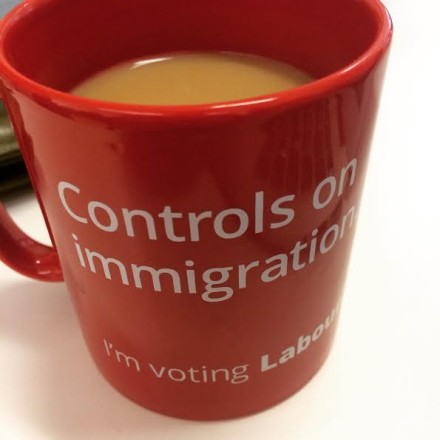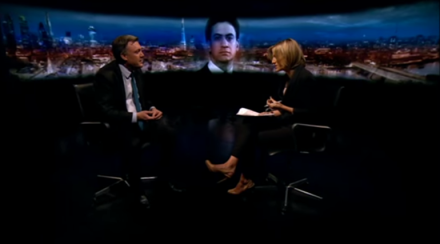
1. Labour’s policy on the deficit didn’t make any sense.
How can you reconcile sending the whole of the Shadow Cabinet on a TUC march against austerity, and then signing up to Conservative spending plans 18 months later?
Maybe it was right to promise cuts and no increase in Government spending. Maybe it was right to go on the march and oppose austerity. But you can’t have your fiscal cake and eat it. Labour managed to convince deficit hawks that it was in favour of ballooning public spending. And it simultaneously managed to convince opponents of austerity that it was in favour of greater cuts.
Wonder what will happen to the #EdStone …. pic.twitter.com/eyGocGVLKv
— Sophy Ridge (@SophyRidgeSky) May 8, 2015
2. The Edstone.
There’s not much to say that hasn’t been said about the Edstone. It looked like a gravestone. Hardly what you want from a party that was supposed to be looking towards the future. It had strange, biblical connotations that made it seem like Labour’s leader thought he was Moses.
But even worse than that. Try reading the Edstone. The pledges don’t make any sense. They’re not even pledges that you could hold someone to. They’re vague buzzwords that aren’t in English. What does “an NHS with time to care” really mean? Nothing. How could you hold someone to a pledge that just says “a strong economic foundation?”
Labour should keep the Edstone in its HQ as a permanent reminder of how stupid a group of people can be when they’re tired and not thinking.

3. Labour’s immigration policy wasn’t honest
Labour supports open door immigration from Europe. Everyone knows that.
So having a mug that says “controls on immigration” is fundamentally dishonest. It’s treating people like they’re stupid. No-one thought Labour was going to control the main bulk of immigration, because we can’t.
Like the economy, Labour managed to convince people who were anti-immigration that it was pro-immigration, and simultaneously convince people who were pro-immigration it was anti-immigration.

4. The Living Wage that wasn’t a living wage
Labour talked a lot about the Living Wage. It was on leaflets. It was in speeches. It was a main part of the party’s community organising strategy. London’s living wage is £9.15. Outside London it is £7.85.
So when Labour promised that the National Minimum Wage would rise to £8 by 2020 it looked bizarre. At the current rate of increase, the National Minimum Wage will probably reach that level anyway.
For all that talk about the Living Wage, Labour’s promise was to “promote” the living wage by giving tax rebates, of which no detail was given.
The net result was that workers didn’t believe that Labour would actually do much to improve their wages – and employers were deeply worried about a big increase in staffing costs.

5. When is a ban on zero hour contracts not a ban?
Labour’s answer to almost all questions on the economy or jobs was to talk about zero hours contracts.
But the party’s policy wasn’t to ban zero-hours contracts at all. It was to allow workers who had worked on zero hours contracts for 3 months to opt in to a regular hours contract. No further details were given. What if a company couldn’t afford to employ all the people on regular hours contracts? What if they were given a 1 hour per week regular hour contract?
What happened? Workers on zero hours contracts didn’t believe the policy would help them and employers were worried about rules they couldn’t afford.
 6. The energy freeze cap
6. The energy freeze cap
Labour announced its energy freeze policy by putting an energy bill inside a giant novelty icecube. But then oil prices fell, and so did energy bills. So what did Labour do? Deny that the policy was ever a freeze. Instead they said it was a cap. But that didn’t make sense. Because you don’t announce a cap with a giant ice cube.
No-one knew that oil prices would collapse. But how did no one in Labour’s top team have the foresight to think that energy prices might not stay at their record high?
7. Refounding Labour
What on earth possessed Labour’s leadership to spend six months negotiating with its own unions about a “refounding” project? Go and ask a voter in Morecombe what they think of Labour’s commitment to “refound” itself. The message was so unclear that party activists had no idea what the reforms meant. Instead of defending the trade union link (which the party is completely reliant on) Labour warily and awkwardly tried to find a way to please everyone, which ended up pleasing no one, and wasted tens of thousands of hours of staff and volunteer time in the process.

8. One Nation Labour
One Nation Labour was supposed to be a gamechanger. The Party’s website was changed. The entire branding of the party was transformed. Labour announced a “One Nation” banking policy. There was going to be a “One Nation” economy. For about 6 months, MPs were banned from saying the party’s name on TV without saying the words “One Nation” first.
Then it was dropped. Completely. The words don’t even appear in the manifesto. It convinced no one and confused everybody.






More from LabourList
‘Unity or division’: Starmer’s message to voters in Gorton and Denton
Almost half of Labour members oppose plans to restrict jury trials, poll finds
‘How Labour can finally fix Britain’s 5G problem’